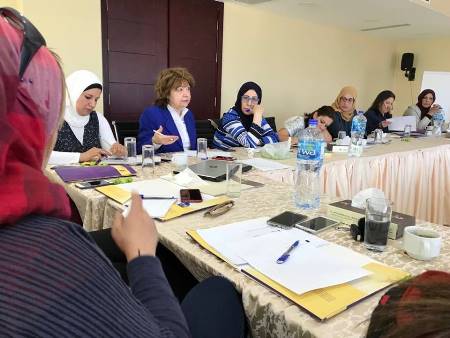|
MIFTAH completes intensive training on how to write public policy papers addressing national reconciliation files
In light of events pertaining to the national reconciliation file and the failed efforts to make any progress in this regard, the WIFAQ committee continued to advocate for the development of practical visions and propose alternative policies, for taking the necessary measures in this regard and for contributing to closing the rift in Palestinian society. It took into consideration the current challenges facing the Palestinian cause given the recent regional and international developments, first and foremost the new US Administration positions and their ramifications on the cause. Based on this, MIFTAH conducted a three-day workshop targeting WIFAQ committee members, associated with the national reconciliation committee as part of its OXFAM-funded project “Confict and Fragilty.” The training focused on the preparation of public policy papers, to enable the WIFAQ committee to formulate a women’s perspective on the national reconciliation files and to present their agendas during reconciliation negotiations and also to enable them to recruit Palestinian public opinion towards adopting alternatives proposed by the committee for dealing with national reconciliation files which have remained unresolved for the past 10 years. Activist and WIFAQ committee member Samar Masri said she gained several skills from the training such as learning how to distinguish between position papers, fact sheets and policy papers and also how to write each one. She also said it built her capacity to discuss related problems and to analyze these papers from all aspects to be able to come up with the best prototypes from among them. “I feel I have much more knowledge because of this training,” Masri said. “I hope there will be other trainings and follow-up by MIFTAH that will further empower WIFAQ members and add to their knowledge”. Meanwhile, assistant professor at the Arab-American University and president of the Arraba Sports Club, Dr. Rula Jadallah said the training first offered her new and important information and also improved her ability to express some of her own ideas in a better way. “Empowering the targeted WIFAQ members necessitates follow-up and more practical training so they will be able to carry out their role at this level,” she said.
 Huthaifa Jalamneh, who supervised the training, maintained that focus was on the concept of public policy and its properties, on the process of creating public policy, the role of citizens and institutions in influencing the public policy process through previous papers, and training the members on the concept of public policy papers, the methodology for building them and why they are used. “The importance of the training comes from the need of the WIFAQ members for this training, which is urgent because the WIFAQ committee cannot wield the necessary influence, whether in terms of women’s issues or general issues, without these skills and knowledge; these are necessary and basic skills for anyone who wants to work on making changes through action and carrying out advocacy and lobbying, especially since WIFAQ’s work focuses on lobbying and advocacy and on trying to change policies pertaining to women’s issues foremost and general issues as well.” Jalamneh stressed on the need for practical training for the committee members, based on the knowledge and skills they gained during the three-day training. He said recommendations were two-pronged. The first were directed at decision-makers on the need for public policies to take into consideration women’s issues in terms of their participation and representation at all levels; the second was a recommendation to MIFTAH to follow-up with the WIFAQ committee so there would be clear efforts by the committee at the level of influencing policies. On her part, MIFTAH project director Najwa Yaghi said this was part of MIFTAH’s effort to widen the circle of dialogue around women’s peace and security agenda with decision-making and influential parties. She said the WIFAQ committee, which includes women activists at the political and social levels from both the West Bank and Gaza Strip, was formed by MIFTAH to support approaches of the women’s coalition for implementing UN Resolution 1325 in Palestine. Following this training, she said the committee would prepare public policy papers on the following files: the PLO, Freedoms and Social Reconciliation, under the supervision of experts in this field. They would also be part of committees which will be put before brainstorming sessions that will enable them to pinpoint the problems and propose realistic alternatives; Palestinian factions will then be urged to adopt these papers. This, in turn, will constitute leverage for achieving national reconciliation in order to protect the Palestinian national project.
http://www.miftah.org |